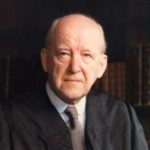
Fear of the Future
“The remarkable thing is that it is possible for such things so to grip us as to paralyze us completely in the present; such people are very often in danger of being so absorbed and gripped by these fears that they really become ineffective in the present. There is no doubt at all that that was the essence of the trouble with Timothy. Paul was in prison and Timothy began to wonder what was going to happen to him.
“What if Paul were to be put to death? How could he, Timothy, face alone the difficulties that were arising in the Church and the persecution that was beginning to show itself and in which he Timothy himself, might be involved? So Paul had to be quite firm with him: and he tells him that he must not be ashamed ‘of the testimony of our Lord, nor of me His prisoner, but be thou partaker of the afflictions of the gospel according to the power of God.’ Fear of the future was undoubtedly the essence of Timothy’s trouble.
“The question for us is, how are we to deal with the condition; how is it to be treated? Once more I cannot think of any better way than to adopt the procedure we adopted with our previous problem. There are certain preliminary general considerations before we come to the precise teaching of Scripture. So I would lay down certain propositions.
“The first thing here again is to discover, and to know exactly where to draw the line between legitimate forethought and paralyzing forethought. Now it is right that we should think about the future, and it is a very foolish person who does not think about it at all. But what we are always warned against in Scripture is about being worried about the future. ‘Take no thought for the morrow,’ means ‘Do not be guilty of anxious care about the morrow.’ It does not mean that you do not take any thought at all, otherwise the farmer would not plough and harrow and sow. He is looking to the future, but he does not spend the whole of his time wondering and worrying about the end results of his work. No, he takes reasonable thought and then he leaves it.
“Here again the whole question is where to draw the line. Thinking is right up to a point, but if you go beyond that point it becomes worry and anxiety and it paralyses and cripples. In other words, although it is right to think about the future, it is very wrong to be controlled by it. The difficulty with people who are a prey to these fears is that they are controlled by the future, they are dominated by thoughts of it, and there they are wringing their hands, doing nothing, depressed by fears about it. In fact, they are completely governed and mastered by the unknown future, and that is always wrong. To take thought is right, but to be controlled by the future is all wrong.
“Now that is a fundamental proposition and the world has discovered it. It has told us not to cross our bridges until we get to them. Put that into your Christian teaching, for the world is right there, and the Christian must accept that wisdom. Don’t cross your bridges until you come to them. Indeed, many Scriptural statements to the same effect have become proverbial – ‘take no thought for the morrow,’ ‘Sufficient unto the day is the evil thereof.’ Certainly the New Testament raises the concept and puts it in its spiritual form. But it is true on the lowest level – ‘Sufficient unto the day is the evil there.’ That is sound common sense. As we saw before, it is a waste of time to be concerned about the past which you cannot affect; but it is equally wrong to be worried about the future which at the moment is obscure. ‘One step enough for me.’ Live in the present to the maximum and do not let your future mortgage your present any more than you should let the past mortgage your present.
“Now let us go on to what the Apostle says. He raises the reasoning to a higher level and gives us specific teaching of a two-fold character. First of all, it is a reprimand, and secondly it is a reminder. Now both these are absolutely vital and essential.
“The first thing he does is to reprimand Timothy. He turns on him and says: ‘For God hath not given us the spirit of fear.’ Now that is a reprimand. Timothy at the moment was guilty of the spirit of fear, he was gripped by it; so Paul reprimands him – ‘God hath not given us the spirit of fear but of power and of love and of a sound mind.’
“The principle, the doctrine here, is that our essential trouble, if we suffer from this particular manifestation of spiritual depression, is our failure to realize what God has given us, and is giving us, in giving us the gift of the Holy Ghost. That was really the trouble with Timothy as it is the trouble with all such Christians. It is a failure to realize what God has done or us, and what God is still doing in us. In fact, we can employ words which our Lord once used in a slightly different connection. In answering James and John who wanted to call fire from heaven to consume certain of the Samaritans, He said: ‘Ye know not what spirit ye are of.’ Now that is what Paul is saying to Timothy. There it was negative, here it is positive. The Apostle has to tell Timothy to stir up the gift of God.
“Our fears are due to our failure to stir up – failure to think, failure to take ourselves in hand. You find yourself looking to the future and then you begin to imagine things and you say: ‘I wonder what is going to happen?’ And then, your imagination runs away with you. You are gripped by the thing; you do not stop to remind yourself of who you are and what you are, this thing overwhelms you and down you go. Now the first thing you have to do is to take a firm grip of yourself, to pull yourself up, to stir up yourself, to take yourself in hand and to speak to yourself. As the Apostle puts it, we have to remind ourselves of certain things. And as I understand it, the big thing that Paul is saying in effect to Timothy is: ‘Timothy, you seem to be thinking about yourself and about life and all you have to do as if you were still an ordinary person. But, Timothy, you are not an ordinary person! You are a Christian, you are born again, the Spirit of God is in you. But you are facing all these things as if you are still what you once were, an ordinary person.’
“And is not that the trouble with us all in this connection? Though we are truly Christian, though we believe the truth, though we have been born again, thought we are certainly children of God, we lapse into this condition in which we again begin to think as if none of these things had happened to us at all. Like the man of the world, the man who has never been regenerated, we allow the future to come to us and to dominate us, and we compare our own weakness and lack of strength with the greatness of the calling and the tremendous task before us. And down we go as if we were but our natural selves.
“Now the thing to do, says Paul to Timothy, is to remind yourself that we have been given the gift of God’s Holy Spirit, and to realize that because of this our whole outlook upon life and the future must therefore be essentially different. We must think of suffering in a new way, we must face everything in a new way. And the way in which we face it all is by reminding ourselves that the Holy Spirit is in us. There is the future, there is the high calling, there is the persecution, there is the opposition, there is the enemy. I see it all. I must admit also that I am weak, that I lack the necessary powers and propensities. But instead of stopping there I must go on to say: ‘Yes, I know it all, but—’ and the moment I use that word ‘but’ I am doing what the Apostle wants me to do. I say: ‘But – but the Spirit of God is in me; God has given me His Holy Spirit.’
“The moment I say that the whole outlook changes. In other words, we have to learn to say, that what matters in any of these positions is not what is true of us but what is true of Him. Timothy by nature was weak and the enemy was powerful, and the task was great. Yes, but he must not think of himself alone or of the situation in terms of himself – ‘God hath not given us the spirit of fear. He hath given us the Spirit of power.’ So do not think of your own weakness; think of the power of the Spirit of God. It is when we begin to do that that we balance our doctrine and see the whole position clearly.”

Martyn Lloyd-Jones (1899-1981) was a Welsh preacher, medical doctor, and author. Considered one of the greatest preachers of the 20th century, he served as minister of Westminster Chapel in London for over 30 years. His books continue to bless Christians across the globe.




Thank you Brother Daniel. This was a real blessing! Pray you’re doing well.
Thank you!